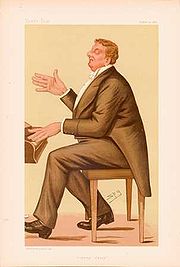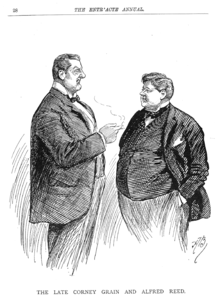
Richard Corney Grain
Encyclopedia


Victorian era
The Victorian era of British history was the period of Queen Victoria's reign from 20 June 1837 until her death on 22 January 1901. It was a long period of peace, prosperity, refined sensibilities and national self-confidence...
.
Biography
Born at TevershamTeversham
Teversham is a small village in Cambridgeshire located roughly from Fulbourn, and is roughly from the centre of Cambridge. It is a small village compared to neighbouring ones...
in Cambridgeshire
Cambridgeshire
Cambridgeshire is a county in England, bordering Lincolnshire to the north, Norfolk to the northeast, Suffolk to the east, Essex and Hertfordshire to the south, and Bedfordshire and Northamptonshire to the west...
, Grain was the youngest son of John Grain, a farmer, and his wife, Mary Anne. His sister, Harriet Ann, was the mother of the barrister
Barristers in England and Wales
Barristers in England and Wales are one of the two main categories of lawyer in England and Wales, the other being solicitors. -Origin of the profession:The work of senior legal professionals in England and Wales...
and judge Sir Travers Humphreys
Travers Humphreys
The Rt. Hon. Sir Travers Humphreys PC was a noted British barrister and judge who, during a sixty year legal career, was involved in the cases of Oscar Wilde, Hawley Harvey Crippen, George Joseph Smith, the 'Brides in the Bath' murderer, and John George Haigh, the 'Acid Bath Murderer'.-Legal...
. Grain received what he referred to as "an average middle-class education". In 1858, at the age of 14, he attended school in Germany
Germany
Germany , officially the Federal Republic of Germany , is a federal parliamentary republic in Europe. The country consists of 16 states while the capital and largest city is Berlin. Germany covers an area of 357,021 km2 and has a largely temperate seasonal climate...
. Returning to Britain
United Kingdom
The United Kingdom of Great Britain and Northern IrelandIn the United Kingdom and Dependencies, other languages have been officially recognised as legitimate autochthonous languages under the European Charter for Regional or Minority Languages...
with an interest in the Law
Law
Law is a system of rules and guidelines which are enforced through social institutions to govern behavior, wherever possible. It shapes politics, economics and society in numerous ways and serves as a social mediator of relations between people. Contract law regulates everything from buying a bus...
, he enrolled as a student of the Inner Temple
Inner Temple
The Honourable Society of the Inner Temple, commonly known as Inner Temple, is one of the four Inns of Court in London. To be called to the Bar and practise as a barrister in England and Wales, an individual must belong to one of these Inns...
on 27 April 1863, and was called to the Bar
Barrister
A barrister is a member of one of the two classes of lawyer found in many common law jurisdictions with split legal professions. Barristers specialise in courtroom advocacy, drafting legal pleadings and giving expert legal opinions...
on 30 April 1866. For a while he practised law on the Western Circuit. However, he had theatrical leanings, and sang and acted in private.
Career
Deciding to give up a legal career and try his hand on the stage, on 16 May 1870 Grain joined what was known as the German Reed Entertainments, at the Gallery of Illustration, appearing in a sketch of his own called The School-Feast. At the same time, Grain entertained privately, performing his comic musical sketches at the piano for fashionable parties and other venues.Grain remained with the German Reed
Thomas German Reed
Thomas German Reed was an English composer and theatrical manager best known for creating the German Reed Entertainments, a genre of musical plays that made theatre-going respectable at a time when the stage was considered disreputable...
s until the end of his life and, after the death of another German Reed stalwart, John Orlando Parry
John Orlando Parry
John Orlando Parry was an English actor, pianist, artist, comedian and singer.-Early career:Parry, the only son of Welsh musician John Parry , was born in London and, at an early age, was taught by his father to sing and to play the harp and the piano. He also studied the harp under Robert Bochsa...
, Grain became the company's principal comedian and sketch artist. He moved with the company to St George's Hall
St. George's Hall (London)
St. George's Hall was a theatre located in Langham Place, Regent Street in London, built in 1867, which closed in 1966. The hall could accommodate between 800 and 900 persons, or up to 1,500 persons including the galleries...
, toured with it in the provinces, and in 1877, after the retirement of Priscilla German Reed
Priscilla Horton
Priscilla Horton, later Priscilla German Reed , was a popular English singer and actress, known for her role as Ariel in W. C. Macready's production of The Tempest in 1838 and "fairy" burlesques at Covent Garden Theatre. Later, she was known, along with her husband, Thomas German Reed, for...
, became the partner of the German Reeds' son, Alfred German Reed (1847-1895), who shared the management of the company with his mother from 1871. Over twenty-five years, Grain wrote between fifty and sixty entertainments for the company, consisting of social sketches and songs with piano accompaniment. His songs included "The Masher King of Piccadilly". His private performances of comic sketches also remained fashionable throughout his career. His last sketch was Music à la mode.
Grain was a large man with exceptionally large and expressive hands. On occasion he took part in comediettas or other dramatic performances, but he claimed that he did not enjoy acting and was not very good at it. W. S. Gilbert
W. S. Gilbert
Sir William Schwenck Gilbert was an English dramatist, librettist, poet and illustrator best known for his fourteen comic operas produced in collaboration with the composer Sir Arthur Sullivan, of which the most famous include H.M.S...
disagreed, asking him to perform in his absurdist comedy with the German Reeds, Happy Arcadia
Happy Arcadia
Happy Arcadia is a musical entertainment with a libretto by W. S. Gilbert and music originally by Frederic Clay that premiered on 28 October 1872 at the Royal Gallery of Illustration. It was one of four collaborations between Gilbert and Clay between 1869 and 1876. The music is lost...
, as "the handsomest man in the world", because of Grain's comical appearance. Similarly in Gilbert's A Sensation Novel
A Sensation Novel
A Sensation Novel is a comic musical play in three acts written by librettist W. S. Gilbert and composer Thomas German Reed. It was first performed on 31 January 1871 at the Royal Gallery of Illustration...
, he played the "spirit of romance". He also played in Gilbert's Our Island Home
Our Island Home
Our Island Home is a one-act musical entertainment with a libretto by W. S. Gilbert and music by Thomas German Reed that premiered on June 20, 1870 at the Royal Gallery of Illustration...
, Ages Ago
Ages Ago
Ages Ago is a musical entertainment with a libretto by W. S. Gilbert and music by Frederic Clay that premiered on 22 November 1869 at the Royal Gallery of Illustration. It marked the beginning of a seven year long collaboration between the two. The piece was revived many times, including at St...
and Eyes and No Eyes
Eyes and No Eyes
Eyes and No Eyes, or The Art of Seeing is a one-act musical entertainment with a libretto by W. S. Gilbert and music originally by Thomas German Reed that premiered on July 5, 1875 at St. George's Hall in London and ran for only a month. The original music was lost, and twenty years later new...
(amusingly, as Pierrot
Pierrot
Pierrot is a stock character of pantomime and Commedia dell'Arte whose origins are in the late 17th-century Italian troupe of players performing in Paris and known as the Comédie-Italienne; the name is a hypocorism of Pierre , via the suffix -ot. His character in postmodern popular culture—in...
). Grain was a great friend and rival of Gilbert and Sullivan
Gilbert and Sullivan
Gilbert and Sullivan refers to the Victorian-era theatrical partnership of the librettist W. S. Gilbert and the composer Arthur Sullivan . The two men collaborated on fourteen comic operas between 1871 and 1896, of which H.M.S...
performer and fellow sketch-artist, George Grossmith
George Grossmith
George Grossmith was an English comedian, writer, composer, actor, and singer. His performing career spanned more than four decades...
.
His autobiography
Autobiography
An autobiography is a book about the life of a person, written by that person.-Origin of the term:...
, Corney Grain, by Himself, first appeared in Murray's Magazine
Murray's Magazine
Murray's Magazine was a monthly magazine published by the John Murray publishing house. Sixty issues were published, from January 1887 through December 1891.It was priced at 1/- ....
and was later issued as a book in 1888. He died of "epidemic influenza" on 16 March 1895, at his home in Marylebone, London. His death, six days after that of Alfred German Reed, ended the German Reed Entertainments, which had been popular for forty years.

